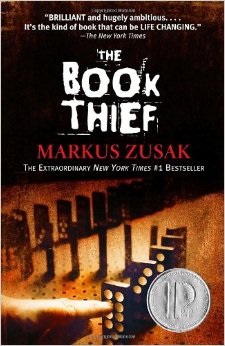 I’ve posted about other haunting books set during wartime (see here and here). The Book Thief, by Markus Zusak, is as haunting as any of those featured in my earlier reviews.
I’ve posted about other haunting books set during wartime (see here and here). The Book Thief, by Markus Zusak, is as haunting as any of those featured in my earlier reviews.
A writer friend of mine gushed one day, “You’ve got to read The Book Thief. It’s so wonderful. And I am the Messenger. Zusak’s language is so good. Every writer should read them.”
She is someone whose opinion I value, so I tried The Book Thief. It was wonderful—beautiful language, a poignant and riveting story. I wasn’t so crazy about Zusak’s first novel, I Am the Messenger. The Australian writer Zusak was more successful in portraying Nazi Germany than in writing about his native country.
The Book Thief is the story of a young girl, Liesel Meminger, whose mother sent her to live with a foster family in Germany during World War II. She is the book thief of the title and steals books from a wealthy woman in town. Her foster family also harbors a Jewish man, and much of the novel deals with the relationship between Liesel and the Jewish Max Vandenburg.
Although the novel has been marketed to a young adult audience, it is a dark and tragic tale, and the narrator is Death. Some readers think Zusak’s choice of perspective is weird, but it worked for me. Death stalks the characters from the very beginning of the story, when Liesel’s little brother dies and she steals her first book, The Gravediggers Handbook. Death is omniscient, while a human character would not be, allowing for a rich story that sees more than Liesel possibly could.
SPOILER ALERTS—THE REST OF THIS POST DISCUSSES THE PLOT AND THEMES IN THE BOOK THIEF.
The characters in The Book Thief were unique: Liesel herself, trying to survive her childhood during wartime; Rosa Hubermann, the gruff foster mother who worries about feeding the child; Hans Hubermann, the artistic foster father who worries he cannot feed Liesel’s spirit and so teaches her to read; the Jewish refugee Max Vandenburg who also feeds Liesel’s love of books; the neighborhood rapscallion Rudy Steiner, as trapped by the war as Liesel is; and the rich mayor’s wife Ilsa Hermann who permits Liesel to steal books from her library.
Death himself is a compelling character. Who knew Death has such a wry sense of humor? He tells us early on:
***HERE IS A SMALL FACT ***You are going to die.
In The Book Thief, Death is overworked in wartime and compassionate toward his customers, not the Grim Reaper of Ingmar Bergman films. He needs a vacation and a distraction. Death explains himself:
. . . why does he even need a vacation? What does he need distraction from? . . .It’s the leftover humans.
The survivors.
They’re the ones I can’t stand to look at, although on many occasions I still fail. . . . It’s the story of one of those perpetual survivors–an expert at being left behind.
It’s just a small story really, about, among other things:
* A girl
* Some words
* An accordionist
* Some fanatical Germans
* A Jewish fist fighter
* And quite a lot of thievery
That, in a nutshell, is the story.
The childhood friendship between Liesel and Rudy develops into puppy love (more on Rudy’s side than on Liesel’s), and the reader yearns for their adolescent infatuation to mature into adulthood. Even Death seems to root for them. But will they survive the war to let it happen?
Although the plotline is often harsh, the moments of kindness in The Book Thief give the tale a humanity—even from Death—that I found both tragic and sweet. Zusak writes about the randomness of life and about how we can change its course through how we treat others. His prose is unsentimental and lyrical, tragic and sweet.
Not everyone dies in the course of the novel, though Death does greet many of the characters. I won’t tell you who dies and who survives. All I’ll say is that I cried.
The Book Thief makes a strong case for the power of words and of writing to maim and to save. As Hitler’s Mein Kampf killed a nation and much of a continent, so Max’s words and Liesel’s own become balm for the soul.
I have not seen the movie, but I’d like to see how much of the mood of the novel was retained. The book has almost 70,000 reviews on Goodreads, so I won’t go into any more detail; you can read about it there. I’ll just say, every writer should read The Book Thief.
What book would you recommend to writers?




I’ve heard so much about The Book Thief, I think it’s time for me to read it. Thanks for a great review, Theresa.
Although the book has been out for over ten years, I really enjoyed The Kite Runner.
Jill, I also enjoyed The Kite Runner, and also Hosseini’s second book A Thousand Splendid Suns. I haven’t read his third.
I hope you enjoy The Book Thief.
Theresa